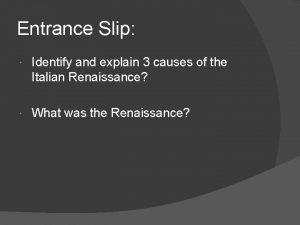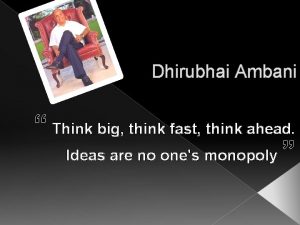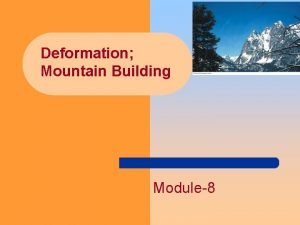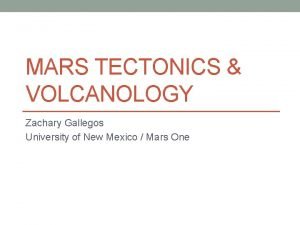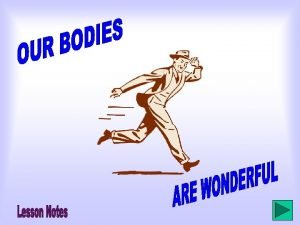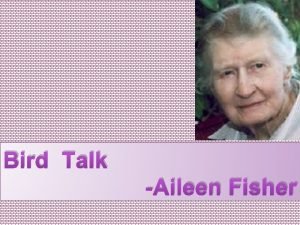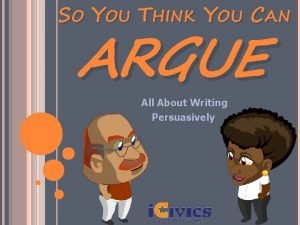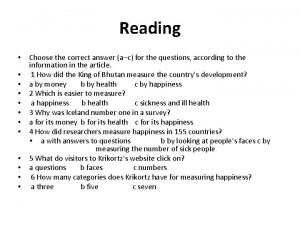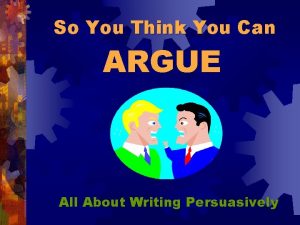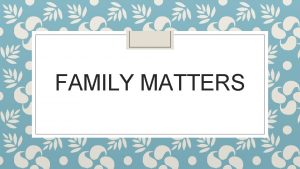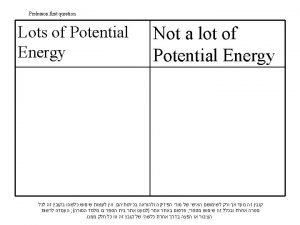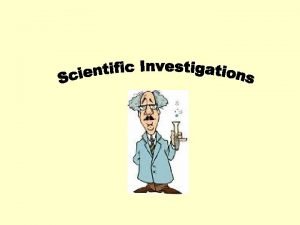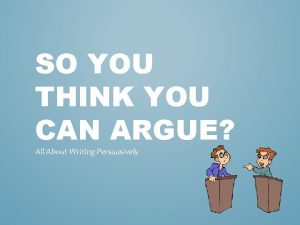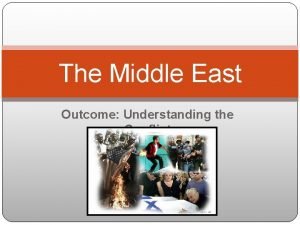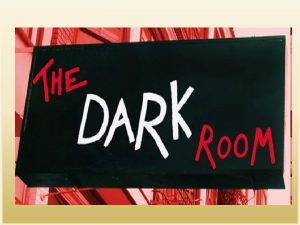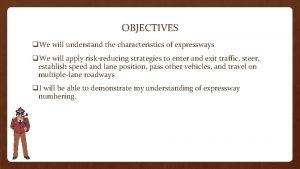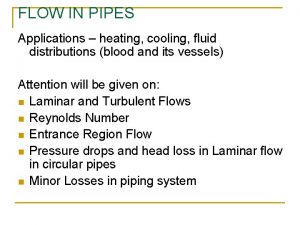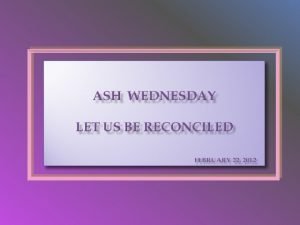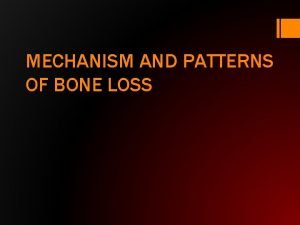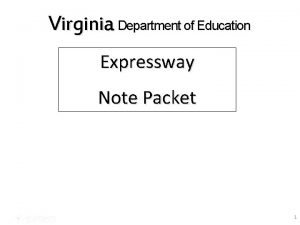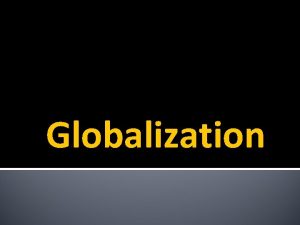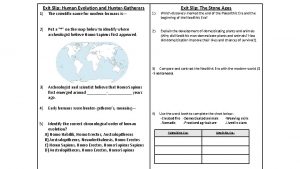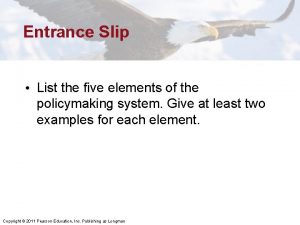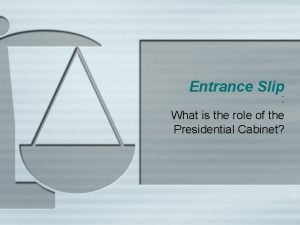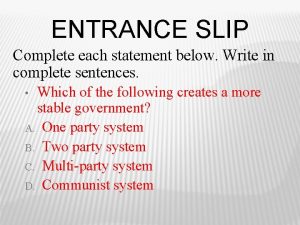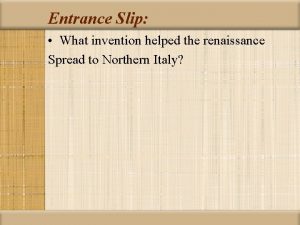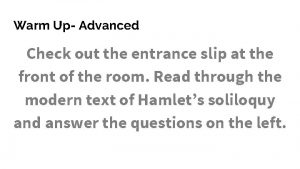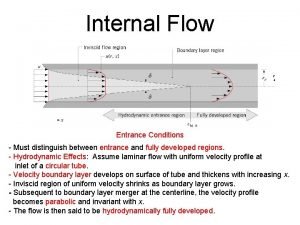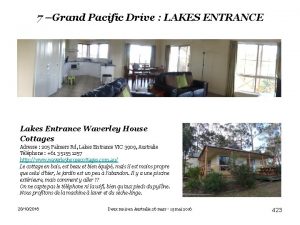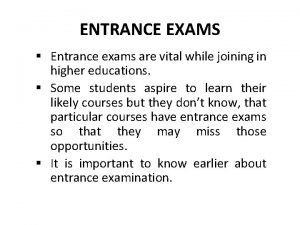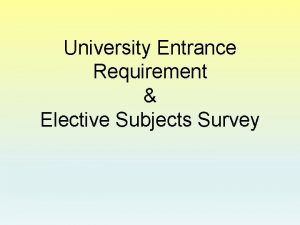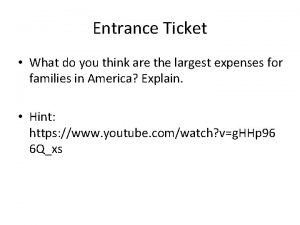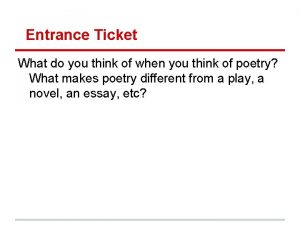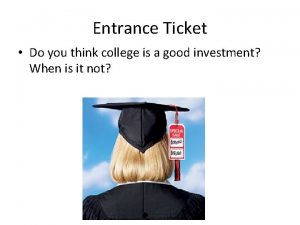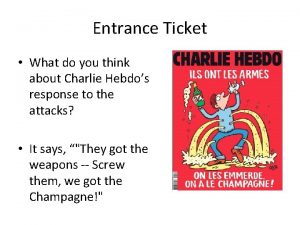Entrance Slip What do you think are the





















![John Locke Flag with Male Symbol By Dave Cutler “The old [traditions] are apt John Locke Flag with Male Symbol By Dave Cutler “The old [traditions] are apt](https://slidetodoc.com/presentation_image/426a894dd985f90878dce2330d57d1a3/image-22.jpg)
![John Locke June 1989 – Tiananmen Square “The end [purpose] of law is not John Locke June 1989 – Tiananmen Square “The end [purpose] of law is not](https://slidetodoc.com/presentation_image/426a894dd985f90878dce2330d57d1a3/image-23.jpg)




![Montesqui eu “When the [lawmaking] and [law enforcing] powers are united in the same Montesqui eu “When the [lawmaking] and [law enforcing] powers are united in the same](https://slidetodoc.com/presentation_image/426a894dd985f90878dce2330d57d1a3/image-28.jpg)




- Slides: 32

Entrance Slip What do you think are the fundamental ideas of democracy?

Bellwork: Please copy and complete this chart: Dictatorship Positive aspect (1) Negative aspect (1) Democracy

agree disagree Angelina Jolie should be able to adopt as many kids as she wants (with or without a husband)

agree The Vikings should be able to sign any player they want and can afford. disagree

agree disagree A single student should be chosen to create all of the rules/consequences at BSHS

agree The power to create laws should be in the hands of the local police force. disagree

agree Members of Congress should not have to face trial for crimes while in office so they can focus on making laws. disagree

agree Your household should make decisions based on “majority rule, ” regardless of age or relationship. disagree

5 Fundamental Ideas of Democracy 1. A recognition of the worth and dignity of each and every person. A. We must respect individuals opinions and respect others opinions. B. During certain times, the welfare of one or a few individuals is inferior to the interests of the common good.

5 Fundamental Ideas of Democracy 2. A respect for the equality of all persons. A. B. Democracy promises equality of opportunity--each should be able to develop herself as fully as he can or cares to. B. Democracy promises equality before the law. The legal systems of a democracy treat everyone the same --

5 Fundamental Ideas of Democracy 3. A faith in majority rule and an insistence of minority rights. A. Democracy believes that the majority will be right more often than they are wrong, and can make political decisions better that one person or one small group can.

5 Fundamental Ideas of Democracy 4. An acceptance of the necessity of compromise. A. Compromise is the process of blending and adjusting and reconciling competing views and interests in order to find the position most acceptable to the largest number.

5 Fundamental Ideas of Democracy 5. An insistence upon the widest possible area of individual freedom. A. No society can exist for long under anarchy, the total absence of government with no restraints on individuals at all. Anarchy usually is chaotic and leads ultimately to dictatorship. B. Democracy doe insists that each individual must be as free to do as she pleases as the freedom of all will allow.

Enlightenment Jigsaw 8 groups – 2 per thinker Each group completes ONE worksheet for paraphrasing, etc – 8 sheets returned. Each group must have spokesperson. Take 20 minutes to read and paraphrase quotations. Groups to present thinker to class. (2 -3 minutes? ) Biography Philosophy of gov’t Beliefs of govt Do general thinkers worksheet (all 4) together.

Locke Rousseau Montesquieu Philosopher Hobbes Biography What ideas did colonists take from the How did this idea differ from philosopher and include in American Great Britain’s government? Government

Ideas

s Hobbe s was born in London in 1588 Went to college at Oxford traveled European countries to meet with scientists and to study different forms of government.

s Hobbe s A Palestinian youth throws a tear gas canister back toward Israeli soldiers during clashes in the West Bank town of Ramallah Friday Feb. 16, 2001 State of nature is the philosophy regarding how humans would act in their most basic state without a civil government. Hobbes believed the state of nature in which man lived before the formation of society was founded on a savage selfishness, which drove man to obtain pleasure without concern for justice or mercy toward other men. State of war-Hobbes believed that in the state of nature, people were always at war with one another, a war of all against all. Each individual was endowed with the right to do anything they pleased and people were in constant fear for their lives.

Thomas Hobbes The Trail of Tears By Robert Lindneux Limited Government is the philosophy that government does not have absolute authority. Hobbes did not believe that there should be many limits on government, but he did not think that a sovereign could do anything that would injure his or her subjects.

John Locke born in Bristol, England, on August 29, 1632. studied medicine at Oxford University in England wrote two treatises of government in 1690

John Locke The Problem We All Live With by Norman Rockwell “The state of nature has a law of nature to govern it, which treats everyone equally …[B]eing equal and independent, no one ought to harm another in his life, health, or possessions. ” John Locke Unalienable rights: Rights that cannot be taken away from anyone, for example freedom of speech. Equal rights: The belief that all persons, regardless of sex, race, ethnicity, age, etc. , have the same rights as everyone else.
![John Locke Flag with Male Symbol By Dave Cutler The old traditions are apt John Locke Flag with Male Symbol By Dave Cutler “The old [traditions] are apt](https://slidetodoc.com/presentation_image/426a894dd985f90878dce2330d57d1a3/image-22.jpg)
John Locke Flag with Male Symbol By Dave Cutler “The old [traditions] are apt to lead men into mistakes, as this [idea] of [fatherly] power’s probably has done, which seems so [eager] to place the power of parents over their children wholly in the father, as if the mother has no share in it. Whereas if we consult reason or [the Bible], we shall find she has an equal title. ” -John Locke
![John Locke June 1989 Tiananmen Square The end purpose of law is not John Locke June 1989 – Tiananmen Square “The end [purpose] of law is not](https://slidetodoc.com/presentation_image/426a894dd985f90878dce2330d57d1a3/image-23.jpg)
John Locke June 1989 – Tiananmen Square “The end [purpose] of law is not to abolish or restrain, but to preserve and enlarge freedom. ” John Locke - Limited Government: A government that does not have absolute authority. Consent of the governed: The political theory that governments gain their authority from their people. A government is not legitimate if the people do not give their consent.

Jean Jacques Rousseau born in Switzerland, an orphan. ran away to Paris where he earned his living as a music teacher. gained great recognition for his writings

Jean Jacques Rousseau Social Contract is the idea that people join groups, and these groups make a presence known as a society. A social contract is the compact that the people agree form rules and conditions for membership in their society. Equality is the belief that all persons are entitled to equal rights and treatment before the George Giusti - 1955

Jean Jacques Rousseau Apollo 11 astronaut Edwin “Buzz” Aldrin stands facing the U. S. flag on the Moon Civil Society occurs after people leave the state of nature. By entering civil society people gain civil liberty and the legal right of property in what he possess. They also gain moral freedom, making

Montesqui eu born in Bordeaux, France, in 1689 to a wealthy family. placed in the care of a poor family during his childhood. studied science and history in college, eventually becoming a lawyer in the local government.
![Montesqui eu When the lawmaking and law enforcing powers are united in the same Montesqui eu “When the [lawmaking] and [law enforcing] powers are united in the same](https://slidetodoc.com/presentation_image/426a894dd985f90878dce2330d57d1a3/image-28.jpg)
Montesqui eu “When the [lawmaking] and [law enforcing] powers are united in the same person, there can be no liberty. ” -Baron de Montesquieu Separation of Powers is the principle of dividing the powers of a government among different branches to guard against abuse of authority. A government of separated powers assigns different political and legal powers to the legislative, executive, and judicial branches.

Montesqui eu Equality under the law is the belief that all people receive fair and equal protection by the government through written law.

Go over some important aspects of station Locke believed that in a state of nature “no one ought to harm another in his life, health, or possessions. ” In other words, he had a positive view of human nature. Compare this view of nature to that of Hobbes. How do these men illustrate contrasting views of human nature? Who do you believe is right? How do you think Locke would respond to our current government? Does the U. S. government function under a social contract? Do citizens have ways of making the government accountable to them? How? Do you agree with Montesquieu’s thoughts about a republican government? What advantages does he believe this form of government has over a democracy?

Declaration of Independence Show you tube video http: //www. youtube. com/watch? v=r. RZCqb 4 j. Yj 4&feature=watch_response (N'Dependent: Bye, Bye-A Declaration) Why would the American colonies want a declaration of independence? What is the purpose of the declaration of independence? Which philosopher do you think most effected the declaration of independence? Why?

Exit Slip: How did Enlightenment ideas influence the creation of American government? How was their “ideal” government different from Great Britain’s government?
 Mikael ferm
Mikael ferm Entrance slip
Entrance slip Dhirubhaism
Dhirubhaism Dip slip vs strike slip
Dip slip vs strike slip Elysium mons
Elysium mons Dip slip fault vs strike slip
Dip slip fault vs strike slip If you think you can you can poem
If you think you can you can poem Think said the robin think said the jay
Think said the robin think said the jay Think family ni
Think family ni Have a daughter so you can argue
Have a daughter so you can argue Choose the correct answer a-c
Choose the correct answer a-c Alan and susie an argument
Alan and susie an argument Fun facts about minecraft
Fun facts about minecraft What comes to your mind when you hear the word family
What comes to your mind when you hear the word family You have more potential than you think
You have more potential than you think What do you think of when you hear the word science?
What do you think of when you hear the word science? What do you think of when you hear
What do you think of when you hear So you think you can argue
So you think you can argue Why are most roadways crowned
Why are most roadways crowned Entrance hidden by bricks and rubble
Entrance hidden by bricks and rubble Xray dark room layout
Xray dark room layout Entrance là loại hoạt cảnh
Entrance là loại hoạt cảnh 3 parts of expressway entrance
3 parts of expressway entrance Inward projecting pipe entrance
Inward projecting pipe entrance Entrance culvert
Entrance culvert Construction entrance
Construction entrance Today's entrance antiphon
Today's entrance antiphon Furcation entrance
Furcation entrance Sequence of bullet holes in glass
Sequence of bullet holes in glass 2 wire video door entry system
2 wire video door entry system Eye clinic york hospital
Eye clinic york hospital Bayview secondary school ib
Bayview secondary school ib Expressway entrance components
Expressway entrance components

